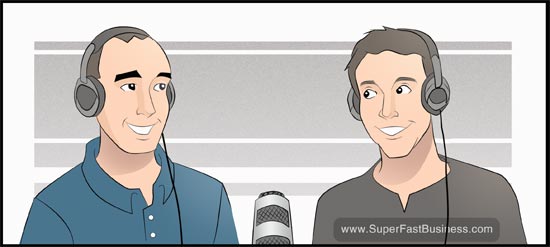Podcast: Download (Duration: 23:09 — 21.3MB)
Get Notified Of Future Episodes Apple Podcasts | Spotify | Amazon Music | Android | Blubrry | Gaana | TuneIn | Deezer | Anghami | RSS | More
Back for another interview, Dane Maxwell shares his success story behind the marketing model and concepts that enabled him to establish his multi-million dollar business.
Podcast highlights:
01:53 – A unique marketing process
03:29 – A great negative qualifier
04:08 – The on-camera element
07:23 – The contest marketing aspect
10:18 – Dane’s marketing model blueprint
13:15 – Documenting your own success
15:49 – Live chat pop-up feature
17:06 – Setting the right marketing mindset
19:37 – Steve Jobs’ take on marketing
21:33 – Going for the longer haul
We can help you grow your business
Tweetables:
Add filters to your application process. [Click To Tweet].
Documentaries are the future of selling. [Click To Tweet].
Manipulation is a cheap tactic. [Click To Tweet].
Talking to customers’ language is important. [Click To Tweet].
Marketing begins before a product is even made. [Click To Tweet].
Your marketing mindset determines your income. [Click To Tweet].
Better marketing means less selling. [Click To Tweet].
Transcription:
James: James Schramko here, welcome back to SuperFastBusiness.com. In our last episode we were speaking to Dane Maxwell who has a business called “The Foundation” and it was a great episode about the steps that you can go through when you’re doing a startup. But what I think is really interesting is to observe other marketers and how they market their own message especially when they believe in it so strongly. So, I want to welcome back to the call Dane.
Dane: What’s up man.
Dane’s Sales and Marketing Process
James: So, Dane, this is a little quick sort of sideways look at your business. We learned all about what it is you teach and who your customers are, I want to talk about your sales and marketing process. A few things that I’ve noticed is that you’re using a really good video production on your sales page. Now, you may not know the results of it yet but it’s so in line with what I’ve been talking about on SuperFastBusiness.
You have some very strong copywriting, you use a huge open loop and you cut between shots of you and then a documentary-style video sharing your event that you must have run, a little thing, and you’re telling stories. I’d love it if you could just give us a little bit of background to that and how you decided on doing that when you know a lot of people use long-form copy, some people use PowerPoint presentations. What was the process in the background for marketing your own product?
Dane: We just did what felt right but you know we’re able to do that because I copied all these sales letters by hand so I understand how to sell. And so like, when you’re doing things in life you become a novice, you learn all the rules and then you learn how to break them, then you break them. Now you’re going to learn but then you break them.
I don’t know if we broke rules with the video or not but we just did what felt right and that’s based on six years of direct response, absorbing direct response into the entire ecosystem of my body. Now we knew that long-form, ugly sales letters work. The thing we found though is that they tend to attract a specific kind of person and what we found is that the quality of your marketing attracts the quality of your people.
So, the quality of our employees, we have like 10 people at The Foundation right now and the quality of the customers are like phenomenal. The community and the foundation is like nuts! Like super sophisticated. Very intelligent. Sceptical as you would usually imagine but still their mind is open and we did that by this high quality video so yeah, the video starts off with an open loop.
You’ve got to keep people hooked. Open loops are like the greatest thing that we found to keep attention and so…
James: Well there is one greater thing though, Dane.
Dane: What’s that?
James: I’ll tell you later.
Dane: You b******. I was like, really, what is it? If you want to pump it up James, you can tell me what it’s not right now.
Screening Out People
James: You know the what it’s not and who it’s not for is the great negative qualifier. Screen off the people who are not ideal which is hinging back on our previous discussion. I screen up startups because my program is not for them and you probably do the opposite and screen out people who think they know everything about making a product first and all that stuff.
Dane: I don’t know how we… like, how strictly we screen out… we have an application process and we project about 10% of the applicants.
James: Well you kick out people who start coding right?
Dane: Yup we do.
James: So it’s not for someone who thinks they can rewrite your principles.
Dane: That is true.
Video Production
James: So some of the things that caught my eye. I mean, I talk a lot about and make a lot of videos. I liked your video production. You had the on-camera element.
How important do you think it was for you to be on camera?
Dane: I don’t know.
James: Well you have a lot of personality in your marketing. I think a lot of the success of your business is coming from your emotional side which is more developed than in a lot of entrepreneurs obviously. How important is it to put that customer there with that documentary-style video?
Dane: Incredibly important. If it was just me talking on a teleprompter with a green screen behind me, that show would be lame. And the first thing I wanted people to understand when they came to The Foundation was like this place is legit and it has depth beyond what you know but we’re going to try and show you that depth so the very first clip was like that gathering into that fireplace room and what we found is that when people watch they, they all want to be joined in that room.
So that happened before I stepped on. I look like so much more of a bada** after I come on after that first part.
Telling Stories
James: I’m seeing a huge trend and I’m going to predict this that the best way of selling in the future is going to be documentary-style engaging stories that happen to have the message built into it. We do this a lot. I do it for my customers, motor dealers, legal customers, I hire a film crew. We make a documentary and that becomes the basis of why people are going to get engaged with them instead of a traditional sales thing.
And you know, people in my mastermind group are filmmakers, interestingly and I started to get a lot of work dealing with business who need an edge over the traditional sales video. But you still got a lot of the elements. You leveraged famous people and you put some famous people in your video to borrow some credibility and to use their points and to bring that into your message; that was very clever.
When you visit your site, you start getting stalked on Facebook. So I noticed you must be using some kind of re-marketing.
Dane: Yup and that’s all done independent of me, we’ve just hired all our staff out. Next we know, we need to do it. I think retargeting is probably the greatest thing that we’re doing right now. But I remember the famous people in the video too.
Yeah, I have a copywriting checklist that I follow that’s really unconscious. It’s like 10 things that we do and one is to borrow credibility from famous people, others to open loops, others to address objections so it’s kind of do all those things automatically.
James: You also had a small town boy come good story.
Dane: Yup. We also have that. I’m so glad you know all these stuff so you bring it out. I forget it all. It’s so unconscious.
That’s why I like the framework inside The Foundation because it’s such an unconscious process for me. I have to go back in and like “Oh yeah, this is what I do here.”
James: Well that’s what I look at people are doing. As well as what they’re saying. And you know you have a very successful approach to the marketing and I imagine that’s transferring to your students when it comes for them to market their products.
You’re also doing something with contest marketing which is something I interviewed some guys in the fitness market for years ago. Way back in the archives here. Someone on the SuperFastBusiness.com is an interview I did with Craig Valentine called the skinny on contest marketing. But how you find the contest marketing aspect?
Contest Marketing
Dane: Well, we’re gearing up to run our first contest. So we have no idea. I’m hoping that it goes really really well.
James: Well we’ll put a link in the shownotes where people can go and have a look at what works. What’s the price?
Dane: So contest is not like anything lame. Like hopefully you never gave this away – like iPads or…
James: Let’s just clear this up right now, Dane. I’m no lame marketer. So you’ll be fine. Chances are I haven’t done it.
Dane: OK, cool. You’re not giving away a free iPad or something? I actually called them lame but it’s like really standard, it’s like, “Oh great, an iPad…”
James: Well I don’t like manipulation generally because it’s just a… it’s a cheap tactic. It means that… it’s usually a crutch for not having something awesome enough so people are really going to resonate with it. However, I think I know what your contest prize is and that’s something people want more than anything.
Dane: Yeah, well the prize is you get a 50 percent partner in one of my businesses with me for a year and collect 49.9 percent profits. So you can like, make decisions. And you collect like 49.9 percent. Basically you collect 50% of the profits the business makes for you for a year.
James: That’s what people want more than anything. They want access to you and they really want someone to do it for them. That’s the ultimate thing that from my experience, when people are on the search for the holy grail, would be “could someone just do everything for me.” That sounds like it’s as close as you might get.
Dane: Well yeah you get to be a partner in a business. You get to see how this software company runs. You get to be like owner so you collect profit whether you work or not. I imagine you probably want to work on it.
We won’t accept people unless they want to work on it but you do play owner and you get trained by me, my CEO, who runs that company and you collect 49 percent of the profits or 50 or whatever. You get to talk to the developer, ask them questions and see how they develop and you get to talk to customers and you’re going to see what it’s like to get a business where people are excited to give you money month after month after month.
And the business at its peak was doing 20 grand a month and the business now is between three to five grand a month. So, your profit that you’re expected to take is 800 bucks a month. Right out of the gate, you’re getting 800 bucks a month. And the business is quickly growing because we have a CEO running it.
It’s like, we’re going to be five or six grand a month just by the time someone comes on board and when you come on board I don’t see issues with you getting back at the 20 grand a month. It’s just a matter of a couple of hours of work a day to keep that business sustaining at 20 grand a month. I just don’t spend the time on it because I want to do a bigger game at The Foundation.
Sources of Sales
James: Right. And now, as part of your process for marketing, you must have some kind of outreach program contacting people with podcast etc. I’ve heard you being interviewed on other podcasts. How effective is that?
Dane: 90 percent of our sales last year came from podcasts. The other 10 percent came from affiliates. So 30 percent at Mixergy, 30 percent from Smart Passive Income and then 30 percent from other various podcasts.
And so podcasts, like we didn’t pay much for affiliate commissions so we do roughly a million dollar launch like 850,000 after 15 percent refund rate which we were not happy with. We want it to be less than 10 percent this year. Made some mistakes that we’re actually correcting.
Like organization of content, access to more mentors, just things that people are unhappy with, worth fixing. And but anyway, those sales came from podcast. But my whole model that I’ve launched every, like the marketing approach I used to launch in every business is I find one customer, I find their pain, I solve their pain, I help them get a result with that pain. I interview them on how they got the result with that pain and I blast that interview out to everyone else in the same target market.
So when I got started with recruiting, real estate recruiting, helping white-listed companies recruit agents. I got one broker to fund for development for the product gave me the idea of everything, gave me the idea, gave me the money, I started with no idea, no money, no expert knowledge. I hired the developer, got the product going then I interviewed him on how well it was going for him.
Blasted it out to all the other brokers and I got like five more brokers that signed up and then when they got success I interview them and blast out those interviews and it’s just the whole interview model then when Paperless Pipeline came out, I solved that one problem to that broker, I organized an entire webinar, I brought that broker on and the webinar was just me interviewing the broker on how awesome Paperless Pipeline is then I had a call to action on it with The Foundation.
I launched it off of an interview on Mixergy where I said hey if you want to get trained by me do a software company go to danemaxwell.com and fill out an application. If I like you, you’re accepted, if I don’t, sorry. That application was the most genius marketing thing ever that people apply and then 88 people join that first group and then we had three really successful people, Sam Ovens being one of them.
Interviewed Sam and Sam became the case study launch of The Foundation so my whole model is, finding the pain, solve the pain, get the result of that customer with the pain, do an interview with how that pain was removed and blast that interview out to other people who have similar pain. That’s my marketing model since day 1 and it’s always worked.
Tooting Your Own Horn
James: It’s a nice one. You know 10 years ago, I went to a friend of mine who owns a smash repair panel shop, not sure that you call them there. Motor repair? And I interviewed him about challenges he was having with the business and then I had him purchase the Dan Kennedy books that I wanted, which I then read and then used the books to solve his problem.
So it was a self-funded training program but you really don’t need to have money if you take your approach. The thing that you do, that little extra step that not many other people do is you are documenting your success then leveraging that by syndicating it. That’s the bit lot of people do not do. You might call it tooting your own horn in a way but because the customer is the hero, you can kind of get away with that.
Dane: Yeah and there’s some really brilliant things like the way that The Foundation, there’s a headline formula that I like to use which is, the end result that the customer wants in a specific period of time while addressing objections. So: “Build a software company in six months.” What they want is in a period of time while addressing objections. So “Build a software company in six months even if you have no idea what to build, limited money or how to code.”
And that’s the headline of The Foundation with that simple headline formula. It’s also the same headline formula that launched Dominos pizza, “Hot fresh pizza delivered in 30 minutes or free.” What they want in a specific period of time while addressing an objection. And the objection happens to be a guarantee.
And so tooting your own horn. What do we launch? Paperless Pipeline. If I would have launched that webinar, the headline of that webinar was “Recruiting Secrets of a 200-plus Agent Office in Tennessee” and then the recruiting secret was using great mobile technology to recruit agents.
Now if I would have named that webinar, like all of my competitors do, real estate transaction management software demonstration, it would not have been nearly as successful so yeah, there’s a lot of little…
Talking In Your Customer’s Language
James: Well headlines are very important and it’s obvious you have strong copywriting. My webinar template was I think the highest conversion webinar template in LeadPages for quite some time. And instead of saying webinar, I called it Free Online Business Coaching.
Dane: Nice!
James: Yeah because a lot of people don’t even know what a webinar is. So talking the customer’s language is important.
Dane: Oh wow! That’s so important. It’s really good.
James: Well this is just a short one Dane because I wanted to find out where this was coming from. You know, so just a quick recap. You do have an inherent sales process. You are a student of copywriting.
You use open loops. You’re using videos. You’re using contest marketing. You’ve developed storylines.
You have a strong reason why you’re leveraging fame. I note that you’re even using Wistia player so you get gold star points from me for that.
Dane: Yeah, dude. Gold star points from James. Something I would gladly go after.
James: Wistia is my absolute favourite. I love Wistia and I also, when I was on your site, I get a little chat pop up window. Do you find that helpful?
Live Chat
Dane: That’s a… one of our students in The Foundation created that business and he went into people using live chat and he was like, “What do you like about live chat? What don’t you like about it?” And in the comment’s response he got, “I don’t like having to do the live chat but I love the idea of it.”
So he created a business where he actually mans and powers the live chat for you so you don’t have to do live chat yourself. So if you have live chat people are closing on you and they charge per conversation or something. I don’t know what the pricing is but it’s reasonable.
And we just installed it a week ago and I’m currently a little nervous that that might distract from a conversions so we’re split testing them on and off and I’ll be able to share the results with you guys in the future. We’re running a few different split tests right now.
James: Well make sure, if you’re not already doing it, harvest the responses and put them back into the sales messaging.
Dane: Beautiful.
James: That’s how I use live chat.
Dane: Beautiful.
James: Because you can get the transcript and well, hopefully you can. Whatever is in that transcript is what someone typed in because it wasn’t on your page. So it’s just an absolute goldmine for your FAQs, your how-to videos, re-do your videos, split test that, etc. So it’s a nice little processed optimization.
What do you think the important lessons about marketing should be shared?
What is Marketing?
Dane: Well, most people think of marketing as like the product… you know like marketing a product or service but marketing to me is all encompassing. Marketing to me begins before a product is even made. I think I like the way we define marketing in The Foundation: Marketing is getting paid to solve problems and getting paid as the marketing and sales solving problems is like really the idea of extraction.
I think that’s what our approach, that’s our definition for The Foundation we’re going to marketing is. I feel like 50 percent of our, well, your income is not defined by your idea. Your income is not limited by your idea, maybe just a little bit.
I don’t like to speak like in absolutes but for the most part, your idea is not what determines how much money you’re going to make. It’s actually your marketing mindset that determines how much money you’re going to make so when I had the recruiting website, my marketing idea was to cold call. That’s what I did. I cold-called brokers and I was making five grand a month.
Then I increased my marketing mindset to do direct response email marketing offers. And my business went from five grand to 10 grand a month.
The Marketing Mindset
Dane: So marketing mindset went from 101 sales to more automated email sales. The third thing I did was add webinars. When I did webinars, my business went from 10 to 20 grand a month. So the idea was the same the whole time but my marketing mindset and my marketing skill increased that’s how my income went up.
You noticed how phone calls, emails and webinars, they’ve nothing to do with the product at all. Nothing at all. It’s all, the money you’re making is the marketing mindset that you have and the skills that you bring to the business.
James: You know I think marketing is simply identifying a group of people who you should be communicating with and then making sure they know about you and in that process, you get to control how they think about you. So that covers everything. This is why we’re talking about videos and documentaries. People need to have a feeling about you and that starts with the design.
The choices you make when you go on camera, the choices you make with your logos, the website they land on, the live chat interaction, all of these things are determining how that customer views you and then you’ll be successful to the extent that you can solve a problem for a lot of people. So scaling your marketing is making more people aware that you are the person that can solve their problem.
Dane: Yeah and marketing isn’t guessing. Marketing is very scientific. Like you have cost to acquire a customer in lifetime value. So when you’re scaling, you just have.. you’re just keeping your metrics in check.
James: Well it’s true from a direct marketing perspective. However, it was interesting when I was reading Insanely Simple about Steve Jobs. He would refuse to use tracking URLs or sub pages.
He would drive his branding and his message straight to Apple.com and it was up to them to make it relevant with the corresponding receiving messaging and drive them into the thing.
So he couldn’t care less about the metrics or the scientific stats and that’s the author’s argument is that’s what the problem with companies like Dell is, that they are too stats obsessed and too slow to roll our stuff so it was really interesting to see that kind of argument for branding and just knowing and going with your “why,” that real reason that you’re putting your stuff out there and getting the resonation and a lot of the stuff that Jobs did was very successful with that approach but it is just a… you know it’s nice to have that counter argument to the strictly scientific side of things.
Dane: That’s awesome. I prefer that approach.
James: I highly recommend. I mean I would have thought that approach would strike a chord with you because you’re an emotional marketer.
Dane: Yes.
James: But I mean marketing is a fascinating thing. I love marketing and to some extent, the better you do your marketing, the less selling you have to do. If people know that you’re the person for them, they like how they feel about it, that it’s obvious that you solved their problem.
You don’t have to do some… you don’t have to do massive manipulations discounting scarcity, you know just tricks and stuff. You have a longer, loyal, customer-based over the long haul.
The thing that I like that you talked about is you’re thinking about your business quite some time in the future and that is just much longer range than most people approach their business so, for our listener, the real takeaway is, if you’re truly clear on who your audience is and how you want to move that audience and you’re going for the longer haul, you can use a concept of technology and storytelling and copywriting and good clean logos and brands. Combine that with some re-marketing and get that message out there.
Do a podcast of course because I’ve been saying this for some time, all of my best customers come from my podcasts. Dane has said exactly the same thing; that’s why we’re sharing this information. We’re putting this information out there for free to stir up a conversation.
Hopefully we’ll generate some comments about this: What’s your view point on marketing? What have you learned from this podcast about marketing? And I suggest people go and have a look at your marketing, Dane, over at The Foundation.
We’ll put a link there. People can go and see what’s happening.
Dane: Cool. I hope this has been helpful.
James: Well, yeah, it’s great.I know you have to head off but I just want to say Thanks for coming back. What I’d love to do is invite you back after your launch and tell us what you learned.
Dane: Absolutely. There’ll be a lot. Cool.
James: Thank you. There’s Dane Maxwell there from TheFoundation.com
For more podcast episodes, subscribe on iTunes
Leave your comments below:










Great interview, James!! I really enjoyed hearing Dane’s ideas, especially the focus of the creative spark. I hadn’t ever thought about it in that way. James, you were so humble in the interview–I’ve seen tons of startups get expert advice from you in Fast Web Formula forum:) You both definitely have a heart for helping people. (Thanks for the Infopack, Dane!)
Great interview, James!! I really enjoyed hearing Dane’s ideas, especially the focus of the creative spark. I hadn’t ever thought about it in that way. James, you were so humble in the interview–I’ve seen tons of startups get expert advice from you in Fast Web Formula forum:) You both definitely have a heart for helping people. (Thanks for the Infopack, Dane!)
thank you Amy, I appreciate you
2 seriously good interviews, both were at concert pitch, if you are listening closely all the answers are there.
2 seriously good interviews, both were at concert pitch, if you are listening closely all the answers are there.
Thank you Michael
You are a quick draw James. This is faster than fast, just like bob http://youtu.be/uASngEbeamc :)
Thanks James and Dane
You are a quick draw James. This is faster than fast, just like bob http://youtu.be/uASngEbeamc :)
Thanks James and Dane